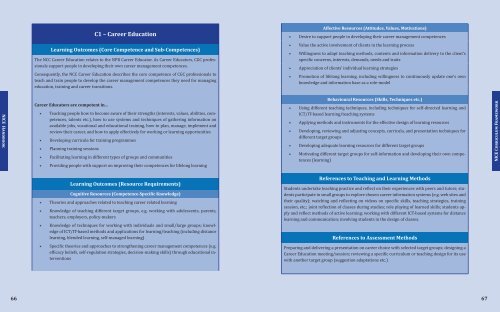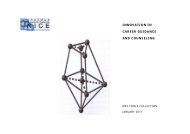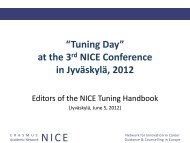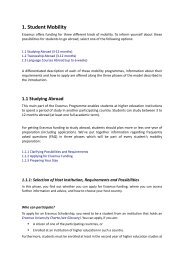NICE HANDBOOK â Academic training of Career ... - Nice-network.eu
NICE HANDBOOK â Academic training of Career ... - Nice-network.eu
NICE HANDBOOK â Academic training of Career ... - Nice-network.eu
You also want an ePaper? Increase the reach of your titles
YUMPU automatically turns print PDFs into web optimized ePapers that Google loves.
C1 – <strong>Career</strong> Education◆◆Affective Resources (Attitudes, Values, Motivations)Desire to support people in developing their career management competencesLearning Outcomes (Core Competence and Sub-Competences)The NCC <strong>Career</strong> Education relates to the NPR <strong>Career</strong> Educator. As <strong>Career</strong> Educators, CGC pr<strong>of</strong>essionalssupport people in developing their own career management competences.Consequently, the NCC <strong>Career</strong> Education describes the core competence <strong>of</strong> CGC pr<strong>of</strong>essionals toteach and train people to develop the career management competences they need for managingeducation, <strong>training</strong> and career transitions.◆◆◆◆◆◆◆◆Value the active involvement <strong>of</strong> clients in the learning processWillingness to adapt teaching methods, contents and information delivery to the client’sspecific concerns, interests, demands, needs and traitsAppreciation <strong>of</strong> clients’ individual learning strategiesPromotion <strong>of</strong> lifelong learning, including willingness to continuously update one’s ownknowledge and information base as a role-model<strong>NICE</strong> Handbook<strong>Career</strong> Educators are competent in...◆◆◆◆◆◆◆◆◆◆Teaching people how to become aware <strong>of</strong> their strengths (interests, values, abilities, competences,talents etc.), how to use systems and techniques <strong>of</strong> gathering information onavailable jobs, vocational and educational <strong>training</strong>, how to plan, manage, implement andreview their career, and how to apply effectively for working or learning opportunitiesDeveloping curricula for <strong>training</strong> programmesPlanning <strong>training</strong> sessionsFacilitating learning in different types <strong>of</strong> groups and communitiesProviding people with support on improving their competences for lifelong learning◆◆◆◆◆◆◆◆◆◆Behavioural Resources (Skills, Techniques etc.)Using different teaching techniques, including techniques for self-directed learning andICT/IT-based learning/teaching systemsApplying methods and instruments for the effective design <strong>of</strong> learning resourcesDeveloping, reviewing and adjusting concepts, curricula, and presentation techniques fordifferent target groupsDeveloping adequate learning resources for different target groupsMotivating different target groups for self-information and developing their own competences(learning)<strong>NICE</strong> Curriculum Framework◆◆◆◆◆◆◆◆Learning Outcomes (Resource Requirements)Cognitive Resources (Competence-Specific Knowledge)Theories and approaches related to teaching career related learningKnowledge <strong>of</strong> teaching different target groups, e.g. working with adolescents, parents,teachers, employers, policy-makersKnowledge <strong>of</strong> techniques for working with individuals and small/large groups; knowledge<strong>of</strong> ICT/IT-based methods and applications for learning/teaching (including distancelearning, blended learning, self-managed learning)Specific theories and approaches to strengthening career management competences (e.g.efficacy beliefs, self-regulation strategies, decision-making skills) through educational interventionsReferences to Teaching and Learning MethodsStudents undertake teaching practice and reflect on their experiences with peers and tutors; studentsparticipate in small groups to explore chosen career information systems (e.g. web sites andtheir quality); watching and reflecting on videos on specific skills, teaching strategies, <strong>training</strong>session, etc.; joint reflection <strong>of</strong> classes during studies; role playing <strong>of</strong> learned skills; students applyand reflect methods <strong>of</strong> active learning; working with different ICT-based systems for distancelearning and communication; involving students in the design <strong>of</strong> classes.References to Assessment MethodsPreparing and delivering a presentation on career choice with selected target groups; designing a<strong>Career</strong> Education meeting/session; reviewing a specific curriculum or teaching design for its usewith another target group (suggestion adaptations etc.)66 67






